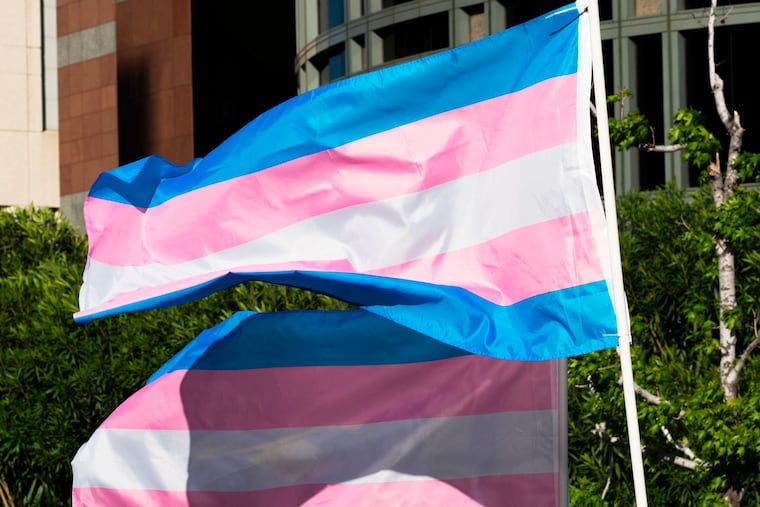As the mom of a trans teen, I celebrate Transgender Day of Visibility with our story
The best way we can counter the chilling effect is by bringing the warmth.

Last Christmas I ordered five matching Pride T-shirts for my family instead of matching pajamas while secretly googling: “What percentages of trans teens change their minds?”
A few months earlier, I held my breath as my husband shaved off our son’s thick, long, black hair. He smiled brightly for the first time in months as he rubbed his hands over his new, stubbly head. In that moment, I exhaled and tried to release four decades of socialized beauty conditioning. And failed.
It’s not always the big things that get me — the research, new name, pronouns, or finding a multidisciplinary team of top mental and health-care professionals (deep thanks to the ineffable Children’s Hospital of Philadelphia’s Gender and Sexuality Development Program).
It’s the little things that bring me to my knees. Unclasping the necklace I haven’t taken off in 11 years. The simple gold chain with our children’s initials that was a gift from my husband when our youngest was born and is now obsolete.
I vacillate between marveling at my son’s integrity as he negotiates who he wants to come out to personally (“They deserve to hear it from me”) and grieving. So many of the opportunities we fought so hard to give him slip away: The sports he can’t play. Swaths of the country he can’t attend for college. States he can’t safely live in.
March 31 is International Transgender Day of Visibility. It’s also the two-year anniversary of the day our oldest child, then 14 years old, came out as transgender.
Yes, it may be dangerous to publicly share details about our lives and our children. Especially in this hostile climate. But laws only change when people change. Those of us in relatively safe environments like Philadelphia may have some responsibility to take more calculated risks than our counterparts in Florida, Texas, or Tennessee.
“Laws only change when people change.”
One year ago this month, Florida passed the notorious Parental Rights in Education Act, or “Don’t Say Gay” law. At least 385 anti-LGBTQ state laws have been proposed in 2023 alone — more than in the past five years combined.
The chilling effects from these laws extend well beyond state lines. Here in Phoenixville, part of suburban Philadelphia, our family faces the reality that there are no safe — only safer — environments. Watching the rising rancor leveled at families like ours by fellow parents — on social media, at school board meetings — is a case study in dehumanization.
Yet 19.7% of Gen Z — those born between 1997 and 2004 — identify as LGBTQ. That means there are a whole lot of parents raising these children. We are not alone. This Transgender Day of Visibility is an opportunity for us, as parents, to share our stories and speak out boldly about our journeys.
If we say nothing, nothing changes. In today’s reductionist prison, if we advocate for our children, we’re accused of pushing a “woke agenda.” If we publicly share any doubts or hesitations, we risk being labeled “anti-LGBTQ.” There is no in-between. And the world becomes no safer for our children.
Moving beyond the binary means infusing our conceptions of the world — be it gender or any facet of civic life — with more complexity.
Parents of LGBTQ kids are trying to build a society that’s never been built before. That’s really beautiful and really hard. Let’s be honest about how challenging this is going to be, about how much easier it’d be to wait for someone else to fix it. Let’s be honest about how much discomfort we’ll each have to undertake to become a country that lives up to our values of liberty and justice for all. Let’s be honest about how much courage we need to look each other in the eyes, share our stories, and say, “Let’s do this together.”
The best way we can counter intolerance’s chilling effect is by bringing the warmth. By throwing open our doors and sharing what it’s like to suddenly find yourself living on the front lines of political warfare while trying to get dinner on the table.
If we don’t own our story, we can’t write the ending. So I’ll begin.
Shannon Mannon is the founder of 3-Minute Storyteller and works with Living Room Conversations. She’s writing a book about her family’s gender journey and path to belonging.